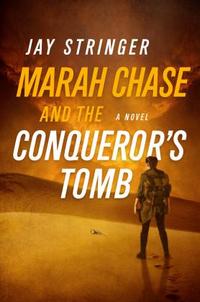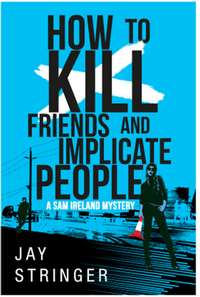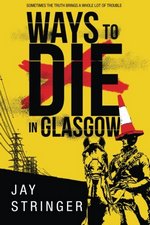 Marah Chase and the Conqueror’s Tomb
Marah Chase and the Conqueror’s Tomb
by Jay Stringer
Series: Marah Chase, #1
eARC, 320 pg.
Pegasus Books, 2019
Read: June 26 – 29, 2019

Right after I finished Stringer’s How to Kill Friends and Implicate People, I jumped onto NetGalley to request this — despite being woefully behind on everything else (including NetGalley books!), curiosity prevailed. I had to know how Stringer would approach this particular premise and character.
What a fun, strange, ride! This is pure escapist entertainment. There’s no message, there’s no pondering foibles of contemporary society, there’s no commentary on social ills (or celebration of social triumphs), just a wild and crazy story about a “renegade archeologist” and a spy battling a cult, a plot to take over the government, and historic artifacts that could easily change the course of civilization. (there is some pretty well-done character growth and development — which grounds the lunacy a bit)
It’s difficult — at best — to not mention the Pop Culture Icon that Marah Chase will remind readers of, and I’ve decided that I’m not up for difficult right now (after trying a few times). Marah Chase is essentially a contemporary, female Indiana Jones — without the legitimate day job. Circumstances forced (well, forcefully encouraged) her to abandon the more scholarly, accepted archeology and to become a “relic runner” or “gold dog.” Someone who finds historic, hard to find, artifacts and sells them to private collectors. It’s hard to say just how successful she is at it — enough to be a known figure throughout the Middle East (to people on both sides of the law), but not enough to get overly-choosy about what jobs she takes.
She’s on the run from a group that pretends to be an arm of ISIS to cover up their criminal activities after scooping a treasure from their grasp when a British spy recruits her to go on the hunt for an artifact rumored to be a powerful weapon. I’ll leave the details to Joanna Mason as she briefs Marah, but what’s driving her to get Marah on the hunt is that she’s convinced a powerful church has decided that a. the weapon is real and b. they are close to finding it. Marah’s always been fascinated by the researcher they’re basing their search on and she’s in probably the best position to stop them before it’s too late.
All she has to do is find the tomb of Alexander the Great — a location that has stumped archeologists, treasure seekers, and zealots for centuries — in the next few days. All she has to do is deal with white supremacist soldiers, faux-ISIS goons, a wealthy and powerful church, an ancient secret society, and worst of all, the granddaughter of the one man in history who may have found (and then covered-up) Alexander’s tomb — her ex.
Marah may be the star of the book — and her name’s in the title — but don’t think that Mason doesn’t play as nearly vital a role in these events. While Marah’s on the hunt for the tomb, Mason’s trying to prevent a bloodless coup from within her own government, one that’ll pave the way for the church to take over.
Both of these women seem to be the embodiment of an amped-up Murphy’s Law — If anything can go stunningly, horribly, mindbogglingly wrong, it will — and usually will involve mortal danger, and then leave you in a worse (and more dangerous) predicament. I quickly stopped thinking that anything would work for either of them and just held my breath until things went from precarious to worse. It’s a tribute to Stringer’s imagination that he was able to keep that up for as long as he did.
Both Marah and Mason are surrounded by a great cast of characters — enemies and allies alike. Honestly, either story line would’ve been enough to keep a novel going and be a lot of fun. You stick both of them together and you’ve got gold on your hands. I’m not sure this is the kind of story that invites in-depth analysis — it’s the kind of story that invites cheers, fist pumps, and would work best with a bowl of popcorn at your side.
For those looking for the Jay Stringer of the Sam Ireland books, they’re going to be disappointed. For those looking for a Jay Stringer using his skills to create a new world, new voice with the same quality, they’re in for a treat. His sense of humor is still evident, it just shows itself in different ways — just as delightful, however. The banter between Marah and her smuggler friend is like catnip to me — I could read it all day long. The action scenes, in particular, are outstanding — there’s one fight on board a plane that will . . . well, no, I’d better not.
Fast-paced, adrenaline-fueled, adventure with a couple of the most marvelous female protagonists you’ll find this year — Marah Chase and the Conqueror’s Tomb is a guilt-free pleasure and a fantastic introduction to what had better be a long-running series.
Disclaimer: I received this eARC from W. W. Norton & Company via NetGalley in exchange for this post — thanks to both for this opportunity.
—–

![]()




 Read a book with “how to” in the title.
Read a book with “how to” in the title.

